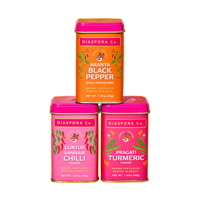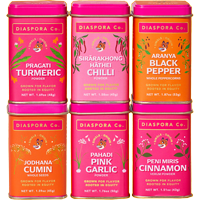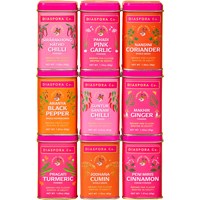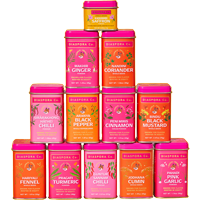Contains
No spices, just the empty dabba and 7 glass jars that fit perfectly into the dabba!
Materials
Dabbas are made of food safe brass and the jars are made of glass.
Perks
The Dabba contains 7 perfectly fitting glass jars that are free of charge. If you choose not to use the glass jars, you can recycle or repurpose them.
Meet the Maker
TIIPOI:
Designed by Tiipoi’s industrial designer Andre Pereira in their studio in London, the Diaspora x Tiipoi Masala Dabba are made in Tiipoi’s workshop in Bangalore by craftsman Venkatesh Chinnappa aka Venky ‘Anna’ (which translates to older brother in nearly all of the South Indian languages ) Venky has been spinning metal for over 25 years and now Tiipoi’s metal products since they began. This craft is at the heart of so many of Tiipoi’s collections. You can read more about Metal Spinning in our blog post too.
Tiipoi is a London based design studio with a workshop in Bangalore founded in 2013 by Spandana Gopal. Tiipoi believes that there is more to Indian design than just sticking an elephant on it, and that Indian craft has more to offer than simply repeating the past.
India can seem a pretty chaotic place. But sitting there, quietly, are some really incredible, super functional designs. The “designers” of these objects if they can be found at all, aren’t celebrated in the same way as they are in other countries, (the Masala Dabba is definitely one such design!) and instead, design is seen as a bi-product of living. This unassuming approach, with an emphasis on a quiet functionality, is what inspires and drives the ethos behind the studio.
India is changing and shifting all the time and Spandana feels there are enough stereotypes and nostalgic stories of India’s past. She prefers to look at what is happening right now and highlight India’s role in contemporary design.
CARE:
Your dabba is made from brass, an alloy of copper and zinc. Like copper, brass is a living metal which develops a patina over time giving it a warmer tone with use. Some people like this aged look, while some prefer to keep it shiny and bright! Clean the dabba as and when you need to, or as a nice seasonal ritual, it's up to you!
Just like you season a cast iron pan, begin your relationship with your dabba by rubbing all over with a little coconut oil and then wipe down with a clean towel to create a protective coating. This will help prevent stains from fingerprints or food touching it, and help it patina more beautifully and evenly.
To clean your patinated dabba:
1. Make a paste of flour and white vinegar (no special ratio, you're just creating a carrier paste for the acid which helps remove the tarnish).
2. Scrub the paste onto the dabba with a soft brush, like our favorite vegetable scrubber or toothbrush. Do not use any kind of steel wool/metal scrubber!
3. Once the stain is removed, rinse with warm water and wipe dry. You may have to do this twice for tougher stains.
4. Finally, rub all over with coconut oil to seal, and wipe off with a soft towel for a smooth shine!
Note: we've found that using Brasso/any kind of chemical cleaner removes the bright gold of the dabba, so we don't recommend this!
You can also check out this process step-by-step on the diasporaco instagram!
FAQs







